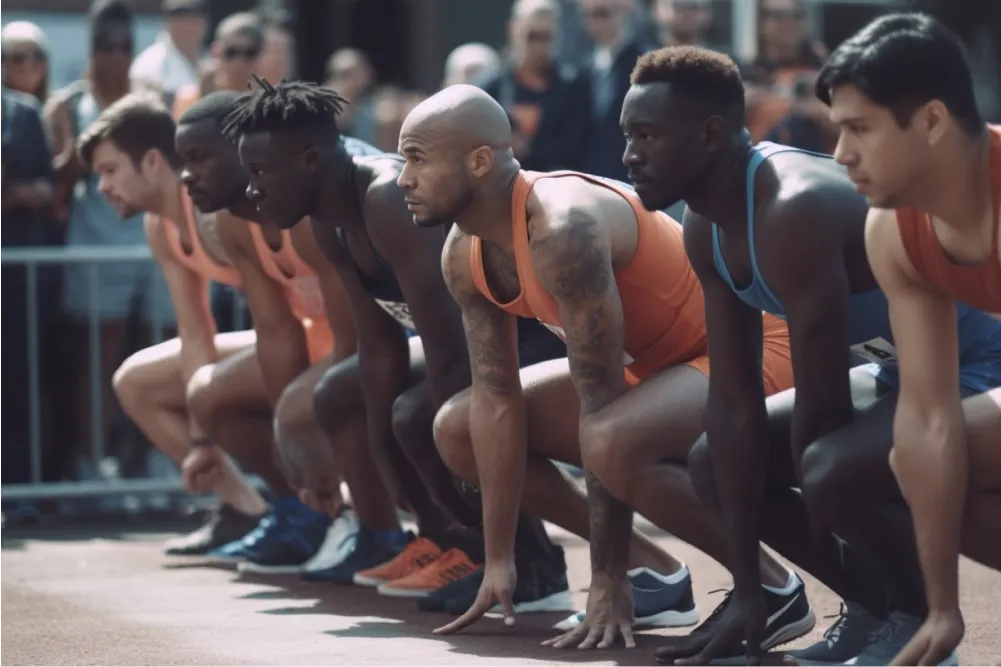Eating disorders and athletes: What's the connection?
Athletes, especially competitive or professional athletes, often feel undue pressure to perform. They may go to extreme lengths to achieve anything that could be considered an advantage in their given sport. While the determination that gets them there is admirable, it can become problematic when focused on achieving a certain weight or body type that may be considered "ideal" for their sport.
If you or an athlete close to you are looking for help in healing disordered eating behaviors, we are here for you. Call Within Health’s clinical care team to learn more about our remote treatment program for eating disorders.
Get help Athletes may need to be within a weight range to participate in their sport, and others may feel that their performance will peak at a specific weight or body composition. Some sports with higher rates of both male and female athletes with eating disorders include:1
- Running
- Judo
- Boxing
- Wrestling
- Gymnastics
- High board diving
- Ski jumping
Overall, athletes participating in endurance sports, weight and body composition-related sports, or aesthetic sports have a significantly higher risk of developing an eating disorder. Unfortunately, athletes with eating disorders face even higher mortality rates than non-athletes with these conditions and may be more susceptible to injury.1
Different eating disorders in athletes
While eating disorders of all kinds affect athletes, just as they affect people who don't play sports, certain types of eating disorders in athletes are more common than others.
Exercise bulimia
Exercise bulimia is not an officially designated eating disorder in the DSM-5, the manual of all medically recognized eating disorders according to the American Psychiatric Association, but the phenomenon can still be seen among athletes with eating disorders.
Those with exercise bulimia will likely experience binge eating episodes, as with anyone with
bulimia nervosa. However, these individuals utilize excessive exercise as their primary form of compensation.
2It may be challenging to spot exercise bulimia, especially in an athlete, as they may not present at a lower body weight and appear to be exercising according to a regular schedule. Generally, over-exercising in itself isn't considered an eating disorder, but when it occurs alongside other disordered eating behaviors, it can be regarded as part of an eating disorder.
3 Anorexia athletica
Anorexia athletica (AA) involves many aspects of anorexia nervosa (AN), including an obsessive focus on body weight and shape and an extreme caloric restriction coupled with extensive exercise.
4AA is an especially prominent eating disorder in female athletes. Sometimes called the female athlete triad in these cases, anorexia athletica involves not just the relative energy deficiency and body image fixation but dysfunction in the menstrual cycle and a lack of bone mineral density.
4 Exercise addiction
Exercise is healthy and often part of a routine, especially for an athlete. So it can be difficult to draw the line between a workout, or even a strenuous workout, and exercise addiction. But this condition does impact many athletes.Some common signs that may indicate
exercise addiction is in play include:
5- Tolerance: The need to increase the amount of exercise to feel the same "buzz" or high from working out.
- Withdrawal: The unpleasant feelings experienced in the absence of exercise, including anxiety, irritability, and problems sleeping.
- Lack of control: An inability to reduce the amount of exercise over a certain period of time.
- Intention effects: The inability to stick to an "intended" workout or amount of exercise, and instead working out harder or for longer periods of time.
- Time: The amount of time dedicated to thinking about working out, getting ready to work out, actually working out, or recovering from a workout.
- Reduction in other activities: A counterpoint to "time," this describes the decrease of other activities or responsibilities to make more time for exercising.
- Continuance: Continually working out despite knowing that it's becoming problematic or despite illness, injury, or fatigue.
Athletes and eating disorders: Treatment options
Eating disorders are dangerous mental health conditions, but eating disorder behaviors in athletes can be successfully treated through a combination of mental, physical, and emotional interventions.
The four primary concerns when treating eating disorders in athletes include:
1- Medical stability: Ensuring the patient is not experiencing electrolyte abnormalities, low bone density, anemia, or other indicators of serious physical health issues.
- Nutritional stability: Establishing sufficient caloric and nutritional levels to maintain a healthy body weight, especially concerning energy expenditure.
- Abstinence: This includes cutting off disordered behaviors related to eating and exercising and working to re-establish moderation.
- Psychological functioning: Ensuring the patient is equipped to deal with not only the mental health considerations of their eating disorder but also the specific issues that may arise in the athletic world.
From a psychological point of view, several types of therapy are generally recommended for helping people with eating disorders, including cognitive behavioral therapy (CBT), which is the leading therapy for bulimia nervosa and other eating disorders. Athletes struggling with eating disorders will likely also benefit from nutritional counseling, meal monitoring, and regular medical check-ins early on in their recovery.4
Those who struggle with excessive exercise may have to take special considerations in mind around regulating their workout schedule. Additional experts should be consulted to help ensure someone is moving their body in a healthy way and not putting themselves in a position for relapse.
Finding treatment for athletes with eating disorders
Anyone can develop eating disorders, including athletes from beginners to elite athletes. In fact, in some cases, athletes may face more risk factors for experiencing these conditions than non-athletes.
Still, eating disorders in female athletes, male athletes, and gender nonconforming athletes alike can be treated with thoughtful care programs.
At Within Health, we pride ourselves on helping to create these types of programs for anyone struggling with these conditions. Our multidisciplinary team designs individual treatment plans based on someone's medical history and current needs, and our program can be followed entirely remotely through our convenient app.
If you or a loved one are struggling with an eating disorder, you can contact us today to find out more about how we can help.
Get help 


















.webp)



